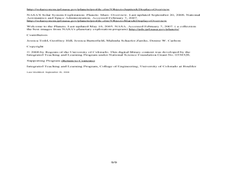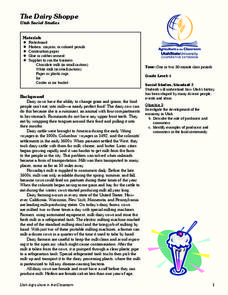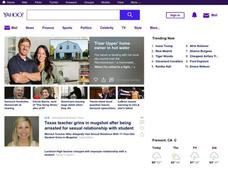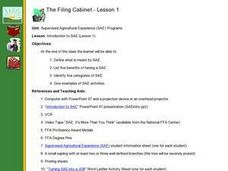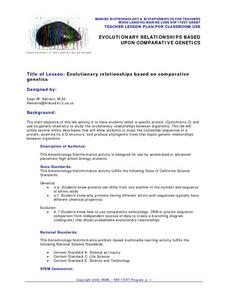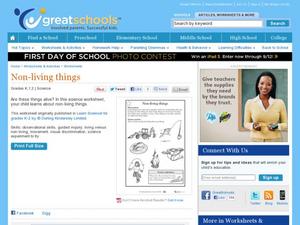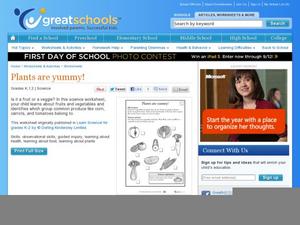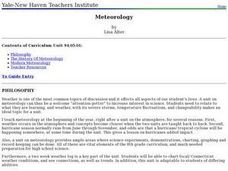Curated OER
Mars and Jupiter
Students learn about how engineers help us to know about Mars and Jupiter. In this Mars and Jupiter lesson, students are introduced to the telescope, deep space antennas, spacecraft, and planetary rovers that engineers designed to help...
Curated OER
The Dairy Shoppe
Fifth graders research dairy farming and learn about dairy products as well as dairy processing. In this dairy lesson, 5th graders read background information about dairy farming and processing. Students discuss running a small business...
Institute of Electrical and Electronics Engineers
Sail Away
Students examine what naval architects and marine engineers do. In this engineering lesson students work in teams and design a boat with a sail structure.
Curated OER
Oil and Energy Consumption
Learners analyze the oil consumption and production information. In this investigative lesson students take the data collected, graph and organize it then draw conclusions about the use of oil worldwide.
Curated OER
The Hat We Wear
Students explore how they can use their skills to apply to the job industry. In this career choice lesson students participate in a discussion and an esteem builder exercise.
Curated OER
Firefighters
Students read books, learn about the letter f, and eat ice cream all to learn about firefighters. For this fire fighters lesson plan, students also string beads to look like fire hose and visit a fire house.
Teach Engineering
Manned Mission to Mars
To go or to not to go — the question for a mission to Mars. This resource provides details for a possible manned mission to Mars. Details include a launch schedule, what life would be like on the surface, and how the astronauts would...
American Psychological Association
Facebook Activity
Imagine if Sigmund Freud or Charles Darwin had a Facebook page. As part of a study of major historical figures in the field of psychology, class members are assigned a psychologist and design a mock Facebook page that includes...
American Farm Bureau Foundation for Agriculture
Welcome to My American Farm!
Take a step into the virtual farm world and explore the impact farming has on our everyday eating habits. Future farmers discover the meaning of agriculture and the hard work that goes into providing food for us to enjoy. A computer...
Curated OER
The Filing Cabinet
Young scholars discuss and identify the job market in agriculture. They define what is meant by Exploratory SAE and list five possible opportunities in the local community. Finally, students differentiate between improvement and...
Curated OER
Why Are The Shore Birds Dying?
Students engage in a field study of birds and how they are in danger harm due to environmental factors. They list different possible causes in a prediction activity. The observations are done while writing up data and connecting it to a...
Curated OER
Tree of Life
Students study genetics and evolution. They evaluate a group of organisms and estimate their genetic relatedness. Then they use an online program to check the accuracy of their estimations and make a branching phylogenetic tree which...
Curated OER
The Filing Cabinet - Lesson 1
Pupils explore and define what is meant by Supervised Agricultural Experience is and list five benefits of having it. They identify five categories of Supervised Agricultural Experience and supply a wealth of examples. Each student...
Curated OER
Are You One of Us?
Students compare and contrast insects and arthropods, identifying characteristics of each. In groups, they sort pictures of arthropods into the five different classes of arthropods. They also sort pictures into insect and non-insect piles.
Curated OER
Evolutionary Relationships Based Upon Comparative Genetics
Students investigate the protein cytochrome c in an attempt to use its genetic chemistry to study possible evolutionary relationships between organisms. The lesson integrates technology with the use computers to perform DNA analysis.
Curated OER
Food for thought
Cake has to be good for something, right? Different foods are used by our bodies in different ways. Learners will first read about what fats, proteins, fruits, and vegetables do for the human body. They will then put each of food shown...
Curated OER
Magnets are forceful
You could use this activity two different ways. As is, or you could have learners actually do the experiment shown. They are to determine which magnet is strongest by counting the number of paper clips hanging from it. Why not get five...
Curated OER
Non-living Things
Very young scientists circle the things on the worksheet that they think are living things. Most of the pictures are of non-living things. A handy worksheet to use during any initial discussion about living vs. non-living things.
Curated OER
Are You One Of Us?
Students discover how to classify things based on their similarities and differences. Students give the characteristics of insects and create a classification list. Given examples of various types of insects, students classify them...
Curated OER
Earthquake Formation
Young scholars explore earthquakes. In this natural disaster and engineer career education lesson, students identify features of the earth's surface that increase the likelihood of an earthquake. Young scholars use visual aids to locate...
Curated OER
Plants are yummy!
Is it a fruit or a vegetable? Youngsters place an F next to each fruit they see and a V next to the vegetables. Corn is tricky. It is a grass, so it's actually not a fruit or a vegetable, but a grain!
Curated OER
Meteorology
Middle schoolers research and produce an oral history that reflects the importance of meterologists in the lives of people in their community.
Curated OER
Know your roots!
Looking at an image of plant systems with their roots in the ground, learners determine which would be the most or least difficult to pull. They write short sentences describing which plant they chose and why. Intended for 3rd or 4th...
Curated OER
A Fishy Tale
Eighth graders do a research project on a particular species of Atlantic seafood and record and graph information pertaining to commercial landings of that species of seafood. They use a website and an Appleworks spreadsheet.
Other popular searches
- Science Careers
- Math and Science Careers
- Food Science Careers
- Earth Science Careers
- Science Careers Lessons
- Science Careers and Centers
- Consumer Science Careers
- Aqua Science Careers
- +Math and Science Careers
- Science and Health Careers
- Health Sciences Careers
- Ath and Science Careers


